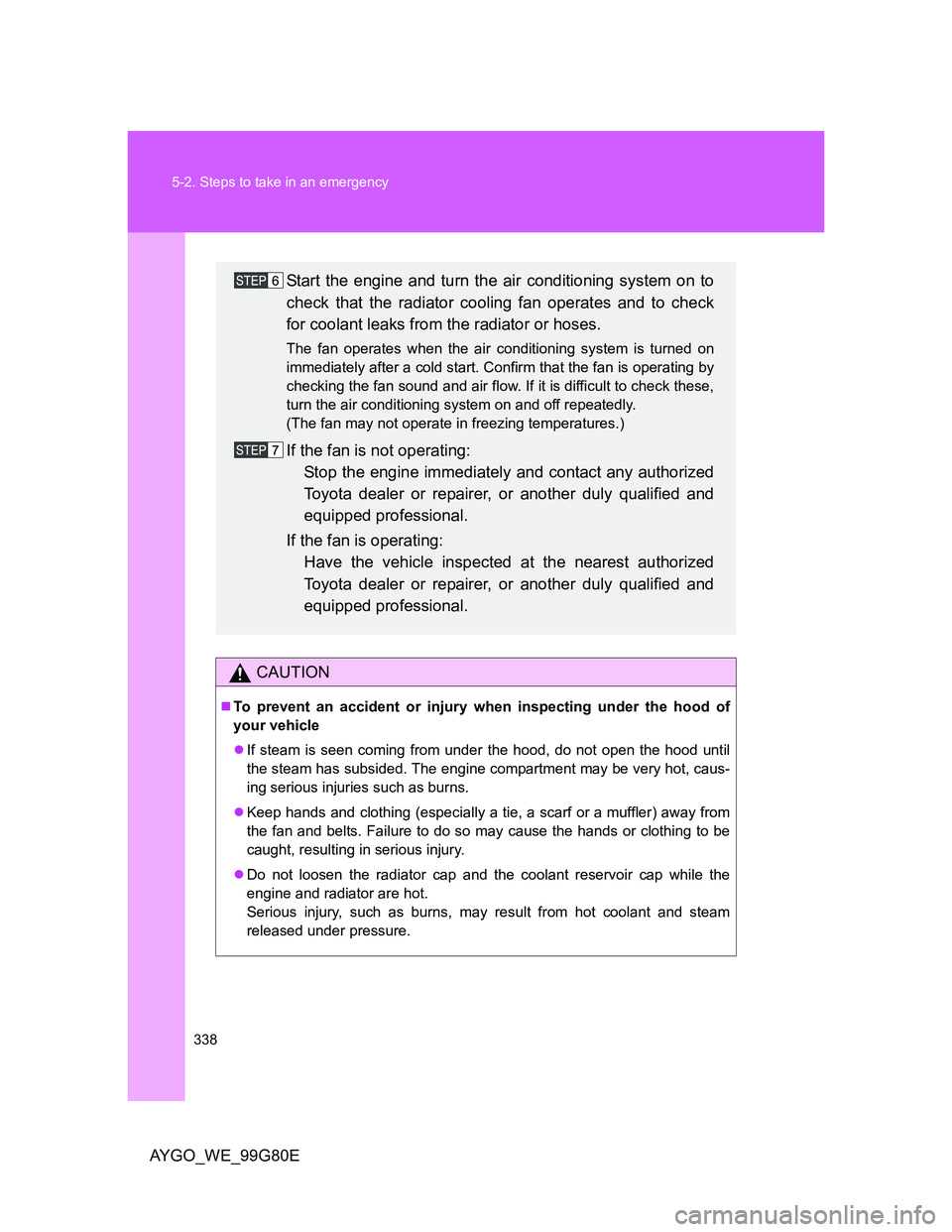Page 253 of 372
253 4-3. Do-it-yourself maintenance
4
Maintenance and care
AYGO_WE_99G80E
CAUTION
When working near the electric cooling fan or radiator grille
Be sure the engine switch is off.
With the engine switch on, the electric cooling fan may automatically start to
run if the air conditioning is on and/or the coolant temperature is high.
(P. 266)
Safety glasses
Wear safety glasses to prevent flying or falling material, fluid spray, etc. from
getting in your eyes.
NOTICE
If you remove the air cleaner filter
Driving with the air cleaner filter removed may cause excessive engine wear
due to dirt in the air.
If the fluid level is low or high
It is normal for the brake fluid level to go down slightly as the brake pads
wear or when the fluid level in the accumulator is high.
If the reservoir needs frequent refilling, it may indicate a serious problem.
Page 260 of 372
260
4-3. Do-it-yourself maintenance
AYGO_WE_99G80E
Engine compartment
Washer fluid tank (P. 269)
Engine oil level dipstick
(P. 261)
Engine oil filler cap
(P. 262)
Fuse box (P. 282)Battery (P. 266)
Engine coolant reservoir
(P. 264)
Condenser (P. 266)
Electric cooling fan
Radiator (P. 266)
Page 264 of 372
264 4-3. Do-it-yourself maintenance
AYGO_WE_99G80E
Engine coolant
The coolant level is satisfactory if it is between the “F” (Full) and “L”
(Low) lines on the reservoir when the engine is cold.
Ty p e A
Reservoir cap
“F” line
“L” line
If the level is on or below the “L”
line, add coolant up to the “F” line.
Ty p e B
Reservoir cap
“F” line
“L” line
If the level is on or below the “L”
line, add coolant up to the “F” line.
NOTICE
To prevent serious engine damage
Check the oil level on a regular basis.
When replacing the engine oil
Be careful not to spill engine oil on the vehicle components.
Avoid overfilling, or the engine could be damaged.
Check the oil level on the dipstick every time you refill the vehicle.
Be sure the engine oil filler cap is properly tightened.
Page 265 of 372

265 4-3. Do-it-yourself maintenance
4
Maintenance and care
AYGO_WE_99G80E
Coolant selection
Only use “Toyota Super Long Life Coolant” or a similar high quality ethylene
glycol based non-silicate, non-amine, non-nitrite, and non-borate coolant
with long-life hybrid organic acid technology.
“Toyota Super Long Life Coolant” is a mixture of 50% coolant and 50%
deionized water. (Minimum temperature: -35C [-31F])
For more details about engine coolant, contact any authorized Toyota dealer
or repairer, or another duly qualified and equipped professional.
If the coolant level drops within a short time of replenishing
Visually check the radiator, hoses, engine coolant reservoir cap, drain cock
and water pump.
If you cannot find a leak, have any authorized Toyota dealer or repairer, or
another duly qualified and equipped professional, test the cap and check for
leaks in the cooling system.
CAUTION
When the engine is hot
Do not remove the radiator cap.
The cooling system may be under pressure and may spray hot coolant if the
cap is removed, causing serious injuries, such as burns.
NOTICE
When adding coolant
Coolant is neither plain water nor straight antifreeze. The correct mixture of
water and antifreeze must be used to provide proper lubrication, corrosion
protection and cooling. Be sure to read the antifreeze or coolant label.
If you spill coolant
Be sure to wash it off with water to prevent it from damaging parts or paint.
Page 337 of 372
5
337 5-2. Steps to take in an emergency
When trouble arises
AYGO_WE_99G80E
Ty p e A
The coolant level is satisfac-
tory if it is between the “F”
(Full) and “L” (Low) lines on
the reservoir.
“F” line
“L” line
Reservoir
Radiator cap
Ty p e B
The coolant level is satisfac-
tory if it is between the “F”
(Full) and “L” (Low) lines on
the reservoir.
“F” line
“L” line
Reservoir
Radiator cap
Add coolant if necessary.
Water can be used in an emer-
gency if coolant is unavailable.
Page 338 of 372

338 5-2. Steps to take in an emergency
AYGO_WE_99G80E
CAUTION
To prevent an accident or injury when inspecting under the hood of
your vehicle
If steam is seen coming from under the hood, do not open the hood until
the steam has subsided. The engine compartment may be very hot, caus-
ing serious injuries such as burns.
Keep hands and clothing (especially a tie, a scarf or a muffler) away from
the fan and belts. Failure to do so may cause the hands or clothing to be
caught, resulting in serious injury.
Do not loosen the radiator cap and the coolant reservoir cap while the
engine and radiator are hot.
Serious injury, such as burns, may result from hot coolant and steam
released under pressure.
Start the engine and turn the air conditioning system on to
check that the radiator cooling fan operates and to check
for coolant leaks from the radiator or hoses.
The fan operates when the air conditioning system is turned on
immediately after a cold start. Confirm that the fan is operating by
checking the fan sound and air flow. If it is difficult to check these,
turn the air conditioning system on and off repeatedly.
(The fan may not operate in freezing temperatures.)
If the fan is not operating:
Stop the engine immediately and contact any authorized
Toyota dealer or repairer, or another duly qualified and
equipped professional.
If the fan is operating:
Have the vehicle inspected at the nearest authorized
Toyota dealer or repairer, or another duly qualified and
equipped professional.